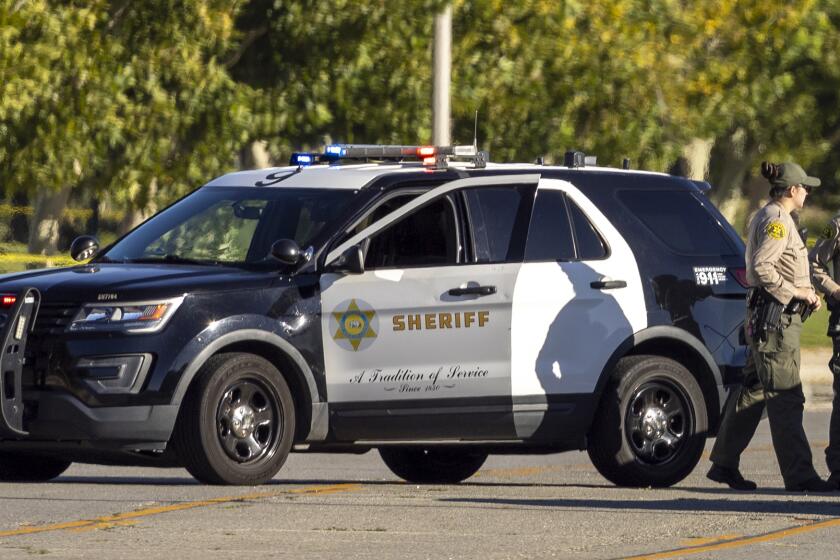Questioning the Worth of Junkets
- Share via
A lot of what counts in government is symbolic.
When times are tough, people want some sort of sign that officials are sharing their misery.
This deep-seated feeling is one explanation for the popularity of news stories portraying the high-living practices of certain government officials. A reporter may spend months on an intricate expose of millions wasted in the city purchasing department, but readers really dig into a story about their elected representatives junketing off to Paris, Hawaii and Tokyo.
After getting bashed on this issue so many times, you’d think government junketeers would cool it, especially during the current recession. The correct symbolism for hard times is riding the RTD.
But, as two recent stories by Times reporter Rich Connell show, the Los Angeles city Harbor and Airport departments never learn.
The trips are called “trade missions” and are designed to persuade foreign exporters, manufacturers, shipping companies and governments to ship more goods through L.A. From the era of Travelin’ Sam Yorty through Travelin’ Tom Bradley, the entourages have consisted of airport or harbor commissioners, City Council members, and, often, the mayor himself.
The harbor spent more than $600,000 last year on sending Bradley, City Council members, harbor commissioners and staff members to Cancun, Barcelona, New Delhi, Singapore and other places. The airport’s travel budget topped $500,000 for the same purpose. That’s twice as much as the agencies spent on such travel six years ago.
Whether or not this money is well spent is an old controversy.
Fanned, no doubt, by jealous stay-at-homes, stories of the trips abound at City Hall and the far-flung travels are the butt of many jokes. Awhile back, The Times tried to get the story firsthand by sending reporter Jane Fritsch to the Far East with Mayor Bradley and some other pols. But the traveling party, including the mayor, hardly talked to her, much less provided her with a daily itinerary.
So, we’re thrown back on secondary sources.
A City Hall whistle-blower familiar with the traveling scene often entertains me with old stories of how the Harbor Department staff, sent abroad on these trips, had catered to the VIP politicians. Instead of negotiating trade deals, the staff members ended up as gofers.
There’s the one about the lost dancing slippers. Jetting from one European port to another, a harbor commissioner’s wife lost her suitcase full of shoes, including the elegant slippers she intended to wear that night. A top staffer interrupted his work and telephoned every airport the party had passed through until he located the suitcase.
In addition to acting as gofers for the traveling pols, the staff carried the money for the trips. The cash and credit cards were usually in the possession of the staff member designated as “the bag man.” When the check arrived for dinners, big receptions and hotel rooms, the bag man picked it up.
During a European trip several years ago, a harbor commissioner wanted to show the folks in his ancestral home town how well the family had done in the United States. So the commissioner, accompanied by the bag man, threw an elegant reception in the finest hotel, with the Harbor Department paying for food, drink and music for all.
Reality may be catching up with the Harbor and Airport departments. Some council members and other city officials are questioning the worth of all that travel.
City Controller Rick Tuttle’s office recently demanded more justification for a commissioner’s limousine rental in Japan and big dinner tabs. After examining the Harbor Department’s travel expenses, auditor Ray Green said, “Quite a few times, I see them as excessive.”
The Harbor and Airport departments argue that Mr. and Ms. Taxpayer aren’t paying for these junkets. Rather, the tab is financed by revenue from harbor leases, airplane landing fees, concession payments and other sources of revenue that flow directly into the treasuries of the Harbor and Airport departments.
But the fact is, the money is needed elsewhere in the city.
The two departments are fat with revenue while the rest of city government--the part that has to pay for cops, firefighters and trash collection--is suffering. The sales tax and other city revenues have been reduced by the recession. The harbor and the airport are now coming under pressure to share their wealth and possibly reduce the tax burden.
Then there’s the symbolism. The Airport and Harbor departments’ frequent fliers make all pols look bad, and some of the City Council members are starting to understand that. You don’t collect frequent flier miles with public money when constituents are worried about their jobs.
More to Read
Sign up for Essential California
The most important California stories and recommendations in your inbox every morning.
You may occasionally receive promotional content from the Los Angeles Times.













